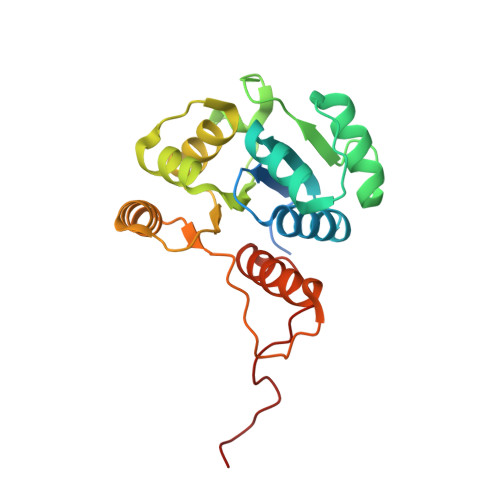The UbiX flavin prenyltransferase reaction mechanism resembles class I terpene cyclase chemistry.
Marshall, S.A., Payne, K.A.P., Fisher, K., White, M.D., Ni Cheallaigh, A., Balaikaite, A., Rigby, S.E.J., Leys, D.(2019) Nat Commun 10: 2357-2357
- PubMed: 31142738
- DOI: https://doi.org/10.1038/s41467-019-10220-1
- Primary Citation of Related Structures:
6QLG, 6QLH, 6QLI, 6QLJ, 6QLK, 6QLL, 6QLV - PubMed Abstract:
The UbiX-UbiD enzymes are widespread in microbes, acting in concert to decarboxylate alpha-beta unsaturated carboxylic acids using a highly modified flavin cofactor, prenylated FMN (prFMN). UbiX serves as the flavin prenyltransferase, extending the isoalloxazine ring system with a fourth non-aromatic ring, derived from sequential linkage between a dimethylallyl moiety and the FMN N5 and C6. Using structure determination and solution studies of both dimethylallyl monophosphate (DMAP) and dimethyallyl pyrophosphate (DMAPP) dependent UbiX enzymes, we reveal the first step, N5-C1' bond formation, is contingent on the presence of a dimethylallyl substrate moiety. Hence, an S N 1 mechanism similar to other prenyltransferases is proposed. Selected variants of the (pyro)phosphate binding site are unable to catalyse subsequent Friedel-Crafts alkylation of the flavin C6, but can be rescued by addition of (pyro)phosphate. Thus, retention of the (pyro)phosphate leaving group is required for C6-C3' bond formation, resembling pyrophosphate initiated class I terpene cyclase reaction chemistry.
- Manchester Institute of Biotechnology, University of Manchester, Manchester, M1 7DN, UK.
Organizational Affiliation:



















